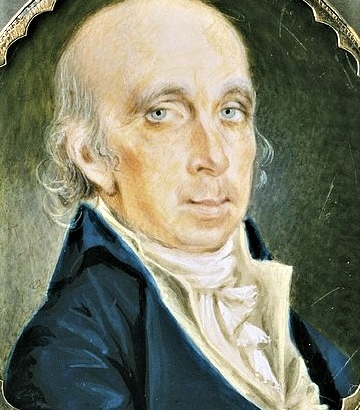Thomas Heyward, Jr. of South Carolina: Lawyer, Judge, Continental Congress Delegate, and Declaration of Independence Signer
Thomas Heyward, Jr. (July 28, 1746-March 6, 1809) was born in St. Luke’s Parish (present day Jasper County). Heyward was the son of Colonel Daniel Heyward and Mary Miles Heyward who were planters. Educated at home, Thomas Heyward, Jr. traveled to England where he studied law and became a member of the Honourable Society of the Middle Temple. Despite his family’s wealth, he cherished scholarship and traveled to Europe during his studies. He valued setting an example of placing importance on educating oneself as his father encouraged.
Heyward was married twice: the first time in 1773 (some records say 1774) to Elizabeth Mathews. Her brother, John Mathews, was governor of South Carolina. After her death in childbirth, Heyward married another Elizabeth, this time Elizabeth Savage Heyward in 1786. He was the father of a total of nine children. Only one of the six children from his first marriage lived to adulthood. The three children from his second marriage all lived to adulthood.
Heyward voiced early his opposition to British rule and the control being forced upon the colonies through such methods as the Stamp Act. Soon after becoming a member of the Continental Congress, Heyward signed the Declaration of Independence, standing with Richard Henry Lee’s Resolution for Independence. Disagreements about whether to support independence included a warning from his father that voting for it could result in being hung. Still, Thomas Heyward believed independence for the colonies was acting in good judgment. With a strong sense of duty, he took notice of the abuses upon his fellow countrymen by the British Crown, further solidifying his resolve to discuss and accomplish independence.
Heyward, like Edward Rutledge, was in the South Carolina Militia. Heyward served as a Captain of Artillery. Both were taken prisoner by the British when Charleston fell in 1780, and considered a “ringleader of the rebellion.” He was eventually released through a prisoner exchange. While heading back, Heyward fell off the ship and nearly drowned. He held onto the ship’s rudder to stay alive until he could be rescued. After his release in a prisoner exchange, and much property damage, Heyward eventually served as a criminal court judge until his retirement in 1798, and also assisted forming a new state constitution as part of his final duties. He also served in the state legislature and presided over the Agricultural Society of South Carolina. While serving as a judge in the new government, Heyward was charged with the difficult task, which he took seriously, of trying, followed by execution for being found guilty, people who were in contact with the British for treasonous reasons.
Heyward was regarded as a strong statesman, of whom Dr. Benjamin Rush, a signer from Pennsylvania described as “a firm Republican of good education and most amicable manners. He possessed an elegant political genius, which he sometimes exercised with success upon the various events of the war.” Heyward died in Jasper County in 1809.
 J. Edward Lee, Ph.D., is Professor of History at Winthrop University. Lee is a former mayor of the City of York, South Carolina.
J. Edward Lee, Ph.D., is Professor of History at Winthrop University. Lee is a former mayor of the City of York, South Carolina.
 Podcast by Maureen Quinn.
Podcast by Maureen Quinn.
Click Here To Sign up for the Daily Essay From Our 2021 90-Day Study: Our Lives, Our Fortunes & Our Sacred Honor
Click Here To View the Schedule of Topics From Our 2021 90-Day Study: Our Lives, Our Fortunes & Our Sacred Honor




Join the discussion! Post your comments below.
Your feedback and insights are welcome.Feel free to contribute!